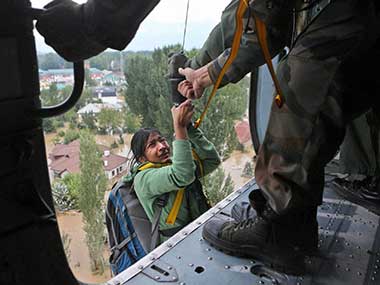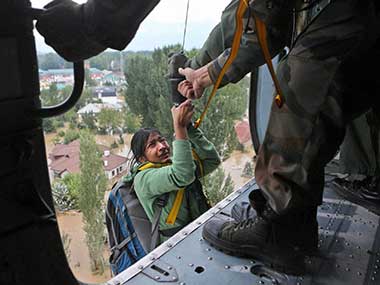By Vivek Bhardwaj It is unethical and uncouth to look for opportunity in tragedy. But such is the complex, almost abnormal, relation between the Army and the people in the Valley that calling the floods a god-sent opening—a watershed moment—may not be immoral or opportunistic. Kashmiris and the security forces have for ages shared a common emotion: mutual distrust verging on animus. But the floods have given them a chance to find something else in common: compassion and empathy. [caption id=“attachment_1705485” align=“alignleft” width=“380”]  Social media is innundated with praise for operation Megh Rahat. PTI[/caption] Hands used to pelting stones, throwing grenades and aiming rifles and guns at each other have been forced to reach out to each other for help and succour. A lot of water, literally and metaphorically, has flown down the Jhelum in the past few days. The media is singing paeans to the role of the Indian Army, arguing that from being perceived as an “occupation force” it is being seen as a ‘humanitarian agency.’ TV channels are beaming live images of rescue operations by brave soldiers. The social media is innundated with praise for operation Megh Rahat. And the jingoistic, chest-thumping brigade has swamped the net with its ‘look, you’d have been dead without them’ rhetoric. All this goodwill is being generated because the Army has sent out 20,000 soldiers, 80 medical teams and thousands others providing back-up, to rescue Kashmiris trapped in Srinagar and other regions facing the flood fury. So, are the arch enemies really turning into friends? Are the demons of domination being hailed as messiahs of Raj Bagh, Nagin and Lal Chowk? Kashmir Flood Information Channel, a group created by youth to coordinate rescue information and share information on the Valley. There you would find dozens of messages from youngsters—it has nearly 13k members—expressing their gratitude towards the Army for keeping their families and friends safe. Look closely, you would find something more heartwarming. Posts criticising the role of the Army, allegations that security forces are saving only tourists and VIPs, are getting pilloried and countered vehemently and immediately—not by the usual suspects but by grateful Kashmiris. Sharief Mohammed, a contract worker with a state government department, was trained in a camp across the Border a few decades ago. Some years later, he decided to start afresh and join the mainstream. These days his job involves going to Kongposh Hotel, a residential-cum-tourist location close to the Boulevard of Srinagar, where security forces covered from head to toe guard the building. “All I noticed for several years was alert eyes peering from behind a helmet grill. There was no intercation between us. The floods have given us the opportunity to look at each other. At least we now know that we are all humans and not just guns and helmets. It is a beginning,” Sharief says. But, nothing in Kashmir is forever. For decades it has been a victim of the ‘politics of last atrocity’, a term coined to indicate how the gains of the past can be wiped out by just one act of terror by hardliners or an excess committed by the security forces. There are already reports of tension as delays in rescue operations raise temperatures and tempers. The NRDF expressed worries about the safety of their men after one jawan was attacked by angry locals. Also, there is every chance that once the water recedes and normalcy is restored, there would be coordinated efforts to ensure the inchoate warmth doesn’t end up breaking the ice between people and security forces in the Valley for ever. The relation between the Army and Kashmiris would be put under strain very soon. When that happens the response would tell us if the new beginning was just a blip or the start of a meaningful relation. But all that is in the realm of future and nobody can predict it. What the Army should, however, be wary of is letting its effort turn into a political tool. We should not forget that the security forces played a stellar role in the Uttarakhand rescue operations and what they are doing in Kashmir isn’t too different. If it was duty and farz in Uttarakhand, it can’t be a favour in Kashmir. Underlining the communal and political subtexts of operation Megh Rahat may be a tempting exercise in PR and jingoism, but going overboard with it could turn counterproductive. There is an old Indian saying: Neki kar aur dariya mein daal. Let the Army do its best in Kashmir and then dump it in the Jhelum.
Kashmiris and the security forces have for ages shared a common emotion: mutual distrust verging on animus. But the floods have given them a chance to find something else in common: compassion and empathy.
Advertisement
End of Article
Written by FP Archives
see more


)
)
)
)
)
)
)
)
)



